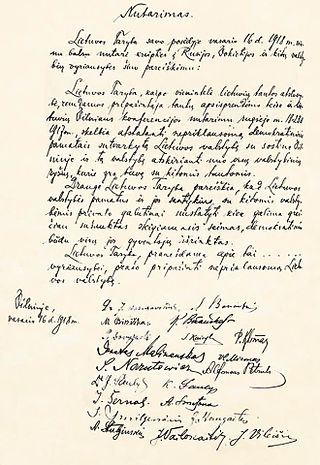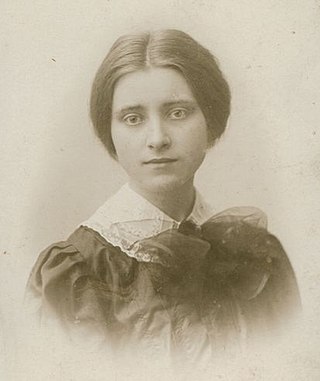Related Research Articles

"Tautiška giesmė" or "Lietuvos himnas", also known by its incipit "Lietuva, Tėvyne mūsų", is the national anthem of Lithuania. The music and lyrics were written in 1898 by Vincas Kudirka, when Lithuania was still part of the Russian Empire. The fifty-word poem was a condensation of Kudirka's conceptions of the Lithuanian state, the Lithuanian people, and their past. Shortly before his death in 1899, the anthem was performed for Lithuanians living in Saint Petersburg, Russia.

Tomas Venclova is a Lithuanian poet, prose writer, scholar, philologist and translator of literature. He is one of the five founding members of the Lithuanian Helsinki Group. In 1977, following his dissident activities, he was forced to emigrate and was deprived of his Soviet citizenship. Since 1980, he has taught Russian and Polish literature at Yale University. Considered a major figure in world literature, he has received many awards, including the Prize of Two Nations, and The Person of Tolerance of the Year Award from the Sugihara Foundation, among other honors.

Lithuanian book smugglers or Lithuanian book carriers smuggled Lithuanian language books printed in the Latin alphabet into Lithuanian-speaking areas of the Russian Empire, defying a ban on such materials in force from 1864 to 1904. In Lithuanian knygnešys literally means "the one who carries books". Opposing imperial Russian authorities' efforts to replace the traditional Latin orthography with Cyrillic, and transporting printed matter from as far away as the United States to do so, the book smugglers became a symbol of Lithuanians' resistance to Russification.

Lithuanian literature concerns the art of written works created by Lithuanians throughout their history.

Salomėja Bačinskaitė-Bučienė, mostly known by her pen name Nėris was a Lithuanian poet.

Zigmas Zinkevičius was a Lithuanian academician, Baltist, linguist, linguistic historian, dialectologist, politician, and the former Minister of Education and Science of Lithuania (1996–1998). Zinkevičius authored over a hundred books, including the popular six-volume "History of the Lithuanian Language" (1984–1994), and over a thousand articles, both in Lithuanian and other languages. He was an academician of the Lithuanian Catholic Academy of Science since 1991 and a full member of the Lithuanian Academy of Sciences from 1990 to 2011, when he became an emeritus member.

The first known record of the name of Lithuania recorded in the Quedlinburg Chronicle in a 9 March 1009 story of Saint Bruno. The Chronicle recorded in the form Litua. Although it is clear the name originated from a Baltic language, scholars still debate the meaning of the word.

The Act of Independence of Lithuania or the Act of February 16th, also the Lithuanian Resolution on Independence, was signed by the Council of Lithuania on February 16, 1918, proclaiming the restoration of an independent State of Lithuania, governed by democratic principles, with Vilnius as its capital. The Act was signed by all twenty representatives of the Council, which was chaired by Jonas Basanavičius. The Act of February 16 was the result of a series of resolutions on the issue, including one issued by the Vilnius Conference and the Act of January 8. The path to the Act was long and complex because the German Empire exerted pressure on the Council to form an alliance. The Council had to carefully maneuver between the Germans, whose troops were present in Lithuania, and the demands of the Lithuanian people.
Jonas Zdanys is a bilingual poet, a leading translator of modern Lithuanian fiction and poetry into the English language., and a literary theorist whose writings on translation theory reinforce a conservative humanistic literary agenda. He was born in New Britain, Connecticut, in 1950, a few months after his parents arrived in the United States from a United Nations camp for Lithuanian refugees. He is a graduate of Yale University and earned a Ph.D. in English literature from the State University of New York at Buffalo, where he studied with Robert Creeley among other writers.

The signatories of the Act of Independence of Lithuania were the twenty Lithuanian men who signed the Act of Independence of Lithuania on February 16, 1918. The signatories were elected to the Council of Lithuania by the Vilnius Conference in September 1917 and entrusted with the mission of establishing an independent Lithuanian state. The proclaimed independence was established only in late 1918, after Germany lost World War I and its troops retreated from Lithuanian territory. What followed was a long process of building the state, determining its borders, and gaining international diplomatic recognition. The signatories succeeded in their mission and independent Lithuania survived until the Soviet Union occupied the state on June 15, 1940.
Vytautas Kernagis was a Lithuanian singer-songwriter ("bard") actor, director, and television announcer. He is considered to be a pioneer of Lithuanian sung poetry.

Vytautas Mačernis was a Lithuanian existentialist poet.

Alfonsas Eidintas is a historian, diplomat and novelist. He was Lithuania's ambassador to various countries.

Martin Ludwig Jedemin Rhesa was a Lutheran pastor and a professor at the University of Königsberg in East Prussia. He is best remembered as publisher of Lithuanian texts. He was the last prominent advocate of the Lithuanian language in Lithuania Minor.
Sigitas Geda was a Lithuanian poet, translator, playwright, essayist, critic and a member of the Lithuanian independence movement, Sąjūdis, and of the Lithuanian parliament, Seimas.
Saulius Šaltenis is a Lithuanian writer, newspaper editor, and politician. In 1990, he was among those who signed the Act of the Re-Establishment of the State of Lithuania. He served as the Minister of Culture from 1996 to 1999 in the Government of Gediminas Vagnorius
Algimantas Anicetas Bučys is a poet, prose writer, translator, literary theorist, historian and critic of Lithuanian literature, doctor of Humanities.

Pranas Vaičaitis was a Lithuanian poet. After graduation from the Marijampolė Gymnasium, he studied law at the Saint Petersburg University. Due to the violations of the Lithuanian press ban, he was imprisoned for a month in 1899 and could not find a jurist job.

Sofija Čiurlionienė née Kymantaitė was a Lithuanian writer, educator, and activist.

Juozas Aputis was a Lithuanian modernist writer, translator and editor. Along with other writers such as Ričardas Gavelis, Aputis is credited for the post-war modernist novella revival in the Lithuanian SSR. He is best known for depicting village life with psychological insight and subtext. His most famous work is Anthill in Prussia, which tells the story of an ascetic man and woman who retreat into the Prussian wilderness.
References
- 1 2 3 4 5 6 Bukontas Alfonsas
- ↑ Donata Mitaitė, [https://web.archive.org/web/20070930155640/http://www.lle.lt/FMPro?-db=lle2004.fp5&-format=detail.htm&-lay=straipsnis&-op=eq&a=b&-max=2147483647&-recid=40431&-find= Bukontas, Alfonsas]
- ↑ Viktorija Sakaitė, Žydų gelbėjimas
- ↑ Sara Poisson Nykstanti žmonių rūšis
- ↑ DEKRETAS Dėl LIETUVOS RESPUBLIKOS IR UŽSIENIO VALSTYBIŲ PILIEČIŲ APDOVANOJIMO LIETUVOS VALSTYBĖS ORDINAIS IR MEDALIAIS VASARIO 16-OSIOS – LIETUVOS VALSTYBĖS ATKŪRIMO DIENOS PROGA 2018 m. vasario 13 d. Nr. 1K-1217